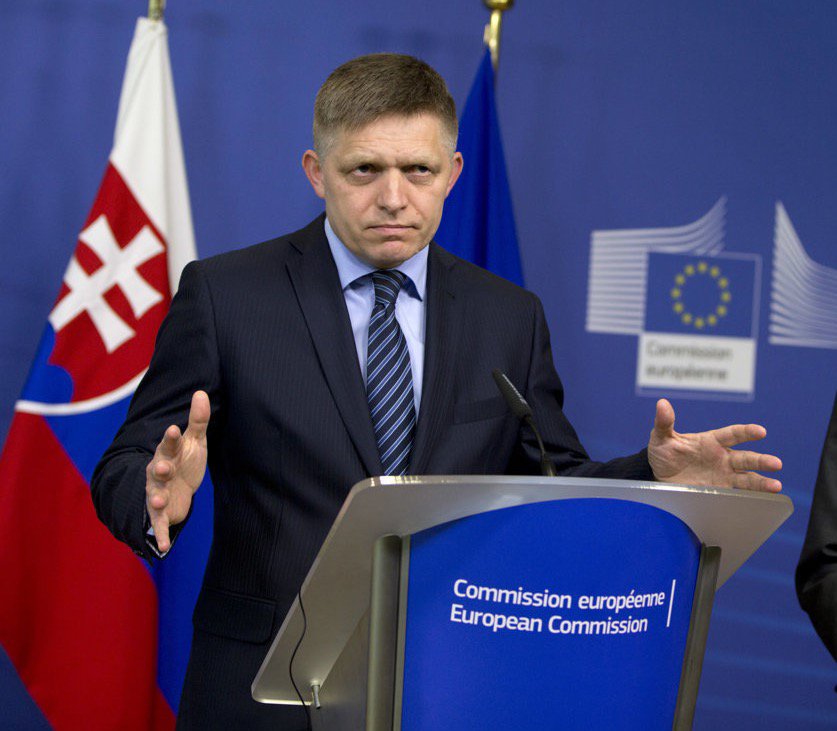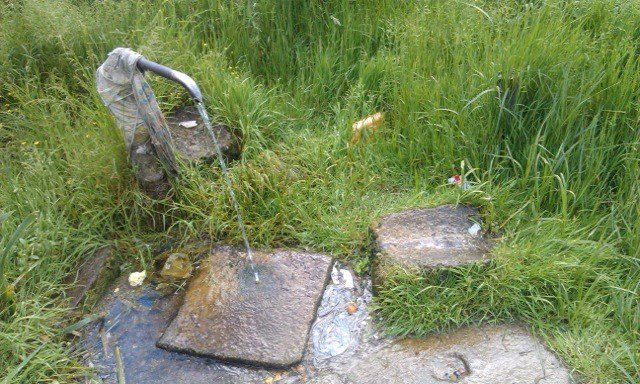The ‘success story’ that wasn’t: Slovakia’s EU Presidency and access to water
13 January 2017
Prime Minister Róbert Fico was quick to hail Slovakia’s EU presidency as a great success. Within days of the country ending its six-month stint at the helm of the European Union, Fico opened the New Year with a press statement describing the Presidency as “truly successful in every extent, all the highest representatives of the EU confirmed that. We received positive feedback from the media. Slovak opposition parties also concluded that this has been a standard Presidency; we liken this to being awarded best marks with distinction.” While Fico may have exuded positivity, he was resolutely alone in eulogising the Slovak Presidency.

Europe’s social democrats boo Fico
The silence from Brussels and other EU capitals was very telling, but even more so was the reception Fico got at a meeting of the Party of European Socialists (PES) in Prague last December. When Fico addressed his fellow PES colleagues from all over Europe, the reception was hostile, prompting “strongly negative reactions” according to Czech media reports: “After his speech, which was considered homophobic, xenophobic, Islamophobic and in its essence anti-European, the delegates in the hall booed him. Slovak Prime Minister was the only one who did not receive applause and delegates from several countries described his speech as having no place in decent society, and that he is the same league as Kaczyńsky [Chair of the ruling Law and Justice Party in Poland] and Orbán [Prime Minister of Hungary]". This political fiasco went unreported in the Slovak media, allowing Fico to claim the presidency was widely praised across Europe as an unqualified success.
Europe’s Roma denied access to clean water
One of the sectorial priorities of the Slovak presidency was the “efficient use of water as a natural resource.” In September 2016, the ERRC sent an open letter to the Slovak Presidency reminding it that beyond droughts and climate change, the efficient use of water needs to be viewed as an issue of social exclusion and ethnic discrimination. We called on the Slovak Presidency to use this opportunity to push for European Council Conclusions to directly address the issue of the acute lack of access to clean water and sanitation in socially excluded Romani communities, and provided clear policy recommendations based on evidence and research gathered by the ERRC. From 2014 to 2016, research conducted by the ERRC in Romani neighbourhoods across seven European countries confirmed that Roma suffer disproportionately from the failures of public authorities to provide access to clean water and sanitation (to be published).
Slovakia’s Roma and the right to clean water
Our field research in Slovakia covering 21 Romani neighbourhoods found that only in two neighbourhoods did most of the Roma households have an indoor drinking water tap; more than 40% of Roma reported that they only have access to a shared water supply; one third declared that they have to walk distances between 150 metres and several kilometres to the nearest water supply. Many reported that their routes to fetch water often necessitates trespassing, and is full of obstacles like highways, railways, forests, and fences. According to the WHO, basic consumption and hygiene practice are compromised by distant water sources to an extent that the risk to public health from poor hygiene is very high.

The only water resource in a Roma settlement in Tvrdošovce, 2014, ERRC.
More than two thirds of Roma respondents declared that they would not be able to afford bringing public water pipes to their homes even if municipalities made this available; a similar number of Roma also reported experiencing seasonal water cuts, with water pumps and wells freezing in winter and drying up in summer; two Roma neighbourhoods had public pumps with lock and credit system devices, which had to be pre-paid at the municipality office before families could fetch water.
Only three Roma neighbourhoods had sewage systems with indoor flush toilets; the majority of Roma had no option but to use self-made dry toilets (pit latrines), or defecate in the open. Finally, the ERRC research identified 16 potential cases of race discrimination in the distribution and availability of these public utilities. In Slovakia as elsewhere the evidence clearly shows that water scarcity in Romani communities is a direct consequence of deliberate decisions taken by public authorities.
Penalising the poor: those with the least pay the most for water
Neither the Slovak Presidency nor the government deigned to respond to the open letter from the ERRC. Undaunted, we continued to track the activities of the Slovak government with specific regard to their impact on “socially excluded Romani communities.”
In June 2016 the government introduced a new fixed water meter charge, which has the effect of making water more expensive for households with lower consumption - the less water you use, the more you pay, and vice versa. This move was seen as a concession by government to pressure from public and private water providers, seeking compensation for their investments in wastewater treatment facilities.
In 2000, Slovakia with all other EU member states committed to connect all municipalities of over 2000 inhabitants to public sewage systems by 2015. Despite the large amounts of EU funds allocated for the development of the wastewater infrastructure in Slovakia, water service providers sought compensation for their matching investments through increased water charges. As it turns out, it seems that the cost of compensating water companies will be disproportionately borne by the Slovak poor, among which Roma are disproportionately overrepresented. Only 20% of these households got connected to the public sewage system due to high costs, and the increase in water fees will hit hardest those poor households that never got connected. These revenues will compensate water companies’ investments in connecting rural middle class homes to waste water treatment facilities, and further increases in water fees are expected next year.
In addition to burdening the poor, the Slovak Presidency kicked off in June 2016 with a new criminal offence related to unofficial manipulation of water, gas or electricity meters coming into force; raising it from a misdemeanour to a criminal offence carrying possible prison sentence of one to 12 years. Although the official purpose was to target company fraud, this measure could affect households in Roma settlements, which often rely on informal water supplies.
However, as our research shows, many Roma households remained entirely unaffected by water meter provisions as they have no water supply at all, and public authorities show not the slightest disposition to connect informal dwellings to any water supply. Other households remain cut off, because they cannot afford to pay several hundred Euros to get connected. Most Roma live in the east and south of the country, where water charges are the highest and significantly more expensive than Bratislava. As in so many cases, it is the poorest that end up paying the most. Unsurprisingly no proposals surfaced during the Slovak Presidency to redress this glaring inequity.
Steps have been taken by the government to improve water access and sanitation in “marginalised Roma communities,” but here is no correlation between the funding currently available and the scale of deprivation. These interventions fall so short of what is needed to bring tangible change that the Slovak Ombudsperson estimated at the current level of government intervention it would take up to 2035 to supply all Roma communities in Slovakia with safe drinking water. Far from increasing access and meeting the commitments enshrined in human rights treaties, current Slovak policy on the “effective use of water” amounts to little more than collective pauperisation of the marginalised in the name of economic efficiency.
Conclusion
The deep concerns about the appalling conditions in our research findings, were echoed by the UN Committee on the Rights of the Child (UN CRC) in their concluding observations issued in July 2016. The Committee found that “a significant percentage of Roma families continues to live in segregated situations and many still do not have access to adequate housing and suffer from a lack of basic facilities such as sanitation, electricity, drinking water, a sewage system and waste disposal”. It urged the government as a matter of urgency, to “adopt policies and allocate budgets for connecting Roma settlements to public drinking water and sewage systems”.
In November 2016 the Slovak Ombudsperson reported on her team’s inquiry into water access in Romani settlements in Slovakia. In 20 randomly selected municipalities with Roma settlements, four Roma settlements had no water supply, and others could only source water from distant wells and fire hydrants. In those settlements that had public water infrastructure, they found that Roma households were either not connected or had been disconnected due to payment arrears. The responsible public authorities have not proposed any measures that would make water connection and fees more affordable for Romani households.
The Ombudsperson concluded “despite its international commitments, the Slovak Republic does not secure access to drinking water in an adequate manner.” This lack of access for many citizens is aggravated by fragmented responsibilities and a new law is needed to provide clarity concerning which of the public authorities should be held accountable to provide Slovak citizens with access to affordable drinking water and sanitation.
Prime Minister Fico’s self-congratulatory remarks on the conclusion of Slovakia’s historic first Presidency of the Council of European Union have not been followed by a flood of plaudits from the rest of the Union. Apart from facilitating some fishery agreements, the most newsworthy moments concerned allegations of corruption against the Ministry of Foreign Affairs over the management of presidency events.
Certainly there were no tangible outcomes on the effective use of water in general, and no progress on access to water for Slovak citizens of Romani origin in particular. Indeed recent measures may even further complicate access to water for those categorised as multiply disadvantaged. Despite international public commitments, solid evidence of deprivation, and mounting international and domestic criticism, the Government continues to ignore the pleas of thousands of their citizens to develop policies that would respect the fundamental right of every person to safe, clean, affordable and accessible water and sanitation.




